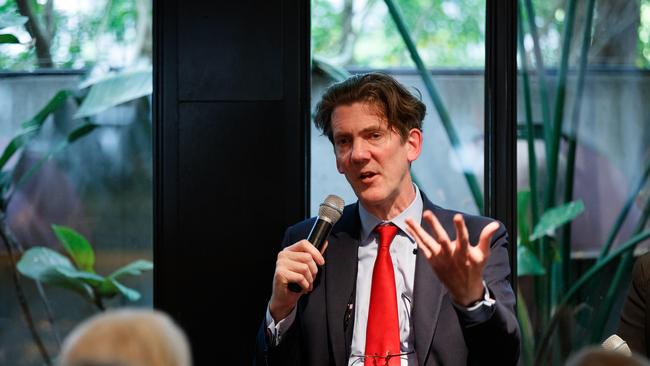‘Poisonous’ inflation responsible for rate hikes, Reserve Bank’s Hauser says
High inflation is ‘harming your family and harming your business’, RBA deputy governor Andrew Hauser has warned.

High inflation is “harming your family and harming your business”, Reserve Bank deputy governor Andrew Hauser has warned, as minutes from the central bank’s September board meeting show it was leaving all options on the table in its efforts to reduce inflation.
With the RBA facing growing pressure to deliver relief after Jim Chalmers declared it was “smashing the economy” last month, Mr Hauser on Tuesday justified its decision to keep interest rates elevated, arguing inflation was still too high.
“That’s why interest rates are at the level they’re at,” Mr Hauser told an event hosted by the Walkley Foundation in Sydney.
Acknowledging that while mortgagors were facing “difficulties that we know come from higher interest rates”, Mr Hauser said that high inflation was “poisonous”, with those on low and fixed incomes, first-home buyers, welfare recipients and older Australians most affected.
“That point sometimes gets quite lost when people talk about interest rates coming down prematurely. It’s because we understand how painful high inflation and high price levels can be that we are taking the steps we take,” he said.
On its most recent measure, headline inflation fell to just 2.7 per cent in the 12 months to August. However, the RBA’s preferred price gauge – trimmed mean inflation, which strips out volatile price movements – remains outside its 2 to 3 per cent target band at 3.4 per cent.
Mr Hauser’s comments followed the release of minutes of the RBA board’s September 23-24 meeting, which noted it was “not possible to either rule in or rule out future changes in the cash rate target at this time” after it ultimately held the cash rate at 4.35 per cent, and governor Michele Bullock effectively ruled out a pre-Christmas rate cut.
Notably, the September meeting minutes removed the line that “it was unlikely that the cash rate target would be reduced in the short term”, which had been included in the August statement. But speaking following the release of the minutes, Mr Hauser said the bank had not changed its tune, arguing that its meeting minutes were not a “particularly dovish message”.
The minutes also show that board members discussed scenarios whereby interest rates risked remaining higher for longer, or could be “tightened further”, conferring further pain on borrowers.
Those included a significant pick-up in household consumption, stronger-than-expected performance of the jobs market, or if supply constraints facing the economy were greater than anticipated. “In this case, the cash rate might need to be noticeably higher than the market path underpinning the August forecasts, in order to bring inflation sustainably back to target by 2026,” the minutes read.
Investors and most economists expect the RBA to cut interest rates by a quarter point at its first meeting of 2025, scheduled for February.
However, even if the board’s concerns about household consumption, the jobs market or supply constraints proved incorrect, the RBA could still be required to deliver additional tightening if its existing run of 13 rate hikes had not slowed the economy as much as it intended.
Alternatively, the RBA board noted it may have to move to cut rates if economic growth proved to be “significantly weaker”.






To join the conversation, please log in. Don't have an account? Register
Join the conversation, you are commenting as Logout